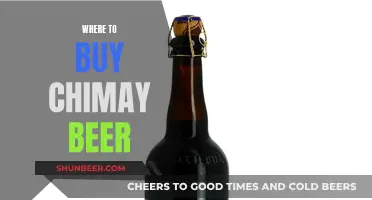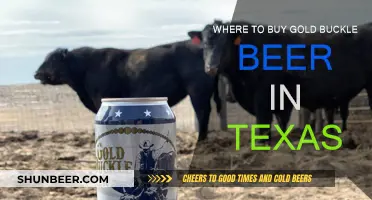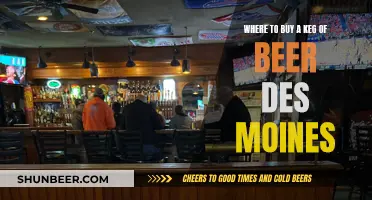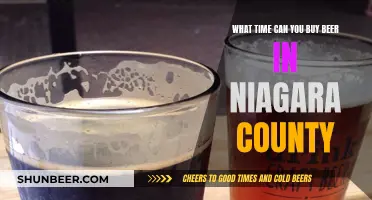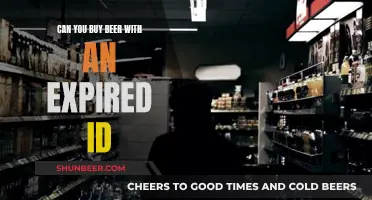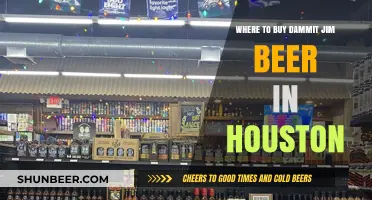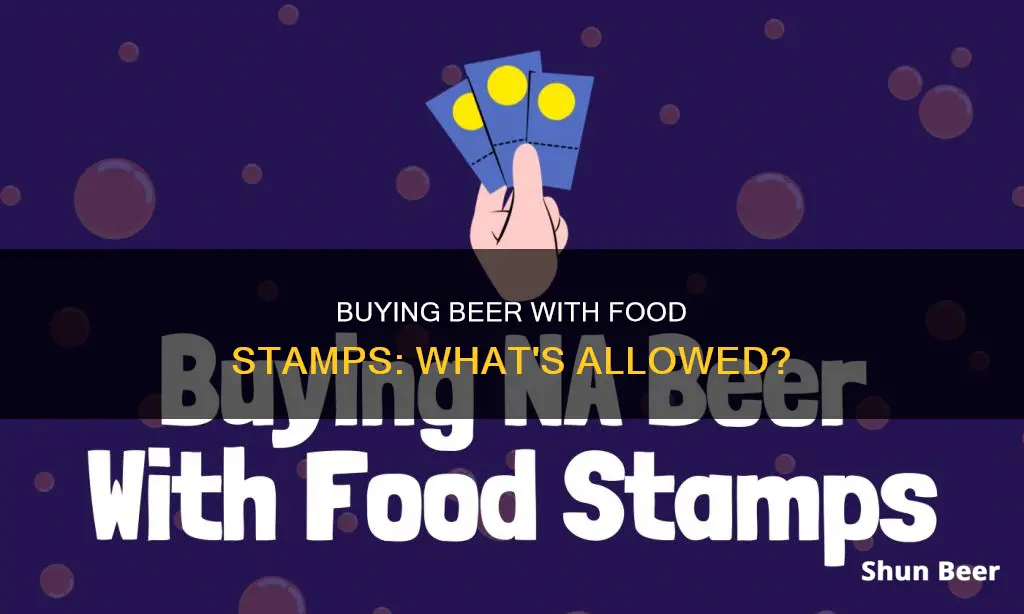
Food stamps, or the Supplemental Nutrition Assistance Program (SNAP), is a federal scheme that aims to combat food hunger in low-income households and families. SNAP benefits can be used to purchase a wide variety of essential food items, including fruits, vegetables, meat, poultry, fish, dairy products, breads, and cereals. However, there is some confusion about whether SNAP benefits can be used to purchase alcohol, such as beer. While a few states do not explicitly ban liquor purchases from programs that use electronic benefit transfer (EBT) cards, the USDA's Food and Nutrition Service has stated that public benefits administered through EBT cards cannot be used to purchase alcohol. This includes beer, wine, and liquor. SNAP recipients who attempt to use their benefits to purchase alcohol may have their transaction denied and could even face consequences such as an investigation for fraud or loss of access to the SNAP program.
| Characteristics | Values |
|---|---|
| Can you buy beer with food stamps? | No |
| Is it forbidden on the SNAP program? | Yes |
| Can liquor stores accept SNAP transactions? | Yes, if a person is purchasing enough food |
| Can you buy alcoholic beverages with SNAP at a liquor store? | No |
| Can you buy beer with TANF benefits? | Yes, under certain circumstances |
| Can you buy beer with SNAP benefits in California? | Possibly, as the state does not dictate how recipients spend their aid |
What You'll Learn

Beer is forbidden on the SNAP program
The USDA's Food and Nutrition Service has dismissed the claim that SNAP benefits can be used to buy alcohol as false. It is, in fact, against federal law to do so. If someone attempts to use their SNAP benefits to purchase alcohol, their transaction will be denied, and they may be investigated for fraud and even lose access to the SNAP program.
A spokesperson for the USDA Food and Nutrition Service, Cherish Meadows, confirmed that "SNAP benefits absolutely cannot cover beer, wine, or liquor." The Special Supplemental Nutrition Program for Women, Infants, and Children (WIC) also operates under these same conditions.
There is confusion around a rule in the SNAP scheme that states that liquor stores can accept EBT transactions if a person is purchasing a large enough supply of food. However, this does not mean that alcoholic beverages will be covered by SNAP benefits. These must be purchased separately and are not eligible for SNAP benefits.
While some other benefit programs, such as the Temporary Assistance for Needy Families (TANF) program, may allow for the purchase of alcohol under specific conditions, SNAP benefits are explicitly forbidden from being used for this purpose.
Ohio Beer Buying Hours: When Can I Buy?
You may want to see also

Some states allow liquor purchases from programs using EBT
While federal benefits provided by the Supplemental Nutrition Assistance Program (SNAP) cannot be used to purchase alcohol, some states do not explicitly ban liquor purchases from other programs that use EBT.
The Department of Agriculture has stated that public benefits administered through EBT cards cannot be used to purchase alcohol. There have been no changes to this rule. However, some states do not explicitly prohibit the use of other programs that utilise EBT for liquor purchases.
One such program is the Temporary Assistance for Needy Families (TANF). TANF is a time-limited program that provides support to families for basic needs. States have the autonomy to establish their own guidelines for eligibility and benefit usage. Unlike SNAP, TANF benefits can be withdrawn as cash from ATMs, and there are no restrictions on how this cash is spent. Therefore, individuals can potentially use TANF funds to purchase liquor if they so choose.
It is important to note that the rules and regulations regarding the use of EBT cards for liquor purchases vary from state to state. For instance, California does not dictate how recipients should spend their public assistance grants, while Texas recommends that public assistance be used only for "essential and necessary" family goods and services.
Yuengling Beer: Available in Illinois?
You may want to see also

SNAP benefits cannot be used to buy tobacco products
In the United States, the Supplemental Nutrition Assistance Program (SNAP) provides low-income families and individuals with benefits to purchase food and other essential goods. SNAP benefits are distributed through Electronic Benefits Transfer (EBT) cards, which function like debit cards that are reloaded with funds each month.
SNAP benefits cannot be used to purchase tobacco products. This includes cigarettes, cigars, and other tobacco products. The rule is very clear and straightforward: tobacco products are not eligible for purchase with SNAP benefits. This restriction is in place to ensure that SNAP benefits are used solely for the purchase of essential food and beverage items.
It is important to note that SNAP benefits are intended to help low-income households access nutritious food options and promote a balanced diet. Tobacco products do not align with this purpose and are therefore not considered a permissible purchase with SNAP benefits. This restriction is consistent across all states that participate in the SNAP program, and any violation of this rule can result in serious consequences.
While SNAP benefits cannot be used to buy tobacco products, it is worth mentioning that there may be some confusion or misconceptions surrounding the use of EBT cards for purchasing certain items. For instance, liquor stores may be authorized to accept SNAP benefits if they meet specific requirements, such as carrying a large enough food inventory. However, this does not change the fact that tobacco products are prohibited from being purchased with SNAP benefits.
Furthermore, while SNAP benefits are meant for food and beverage purchases, there are certain exceptions within the program. For example, SNAP benefits can be used to buy seeds and plants that produce food for the household. Additionally, benefits can be used for non-food items for infants, such as baby formula. However, these exceptions do not extend to tobacco products, which are explicitly excluded from SNAP-eligible purchases.
Guinness Beer: Where to Buy and Enjoy a Pint
You may want to see also

Alcohol can be purchased on the TANF program
In the United States, it is not legal to purchase alcohol with food stamps. Food stamps, also known as SNAP (Supplemental Nutrition Assistance Program), are intended to help low-income families buy nutritious food and boost the agricultural industry. Since the program's inception in 1961, the purchase of alcohol with food stamps has been prohibited. This restriction also applies to tobacco products, vitamins, medicines, supplements, and live animals, among other non-food items.
However, there is a distinction to be made between SNAP benefits and cash assistance programs like TANF (Temporary Assistance for Needy Families). While you cannot directly use SNAP benefits to buy alcohol, there is some ambiguity when it comes to TANF.
With TANF, individuals receive cash benefits that can be used to purchase a variety of essential items, including food, clothing, and household supplies. TANF benefits are typically provided through an EBT (Electronic Benefit Transfer) card, similar to SNAP. However, unlike SNAP, there is no restriction on using TANF cash benefits to purchase alcohol or other non-essential items.
Once TANF cash benefits are withdrawn from an ATM, the money becomes untraceable, and there is no way to ensure that it is only used for "essential" purchases. While it is illegal to use the EBT card directly to buy alcohol, the cash withdrawn from authorized locations can technically be used for any purpose, even if it is not explicitly legal. This loophole in the system allows individuals to use their TANF benefits indirectly to purchase alcohol if they so choose.
It is important to note that while there is no legal restriction on using TANF cash benefits to buy alcohol, it is still subject to personal responsibility and discretion. The primary purpose of TANF is to provide assistance for essential needs, and using the benefits for non-essential purchases may defeat the program's intent. Additionally, there are consequences for misusing TANF funds, including penalties, loss of benefits, and repayment requirements.
Best Places to Buy Lone Star Beer
You may want to see also

Liquor stores may be authorised to accept SNAP benefits
The general rule is that SNAP benefits cannot be used to purchase alcoholic beverages. However, there is an exception that allows liquor stores to accept SNAP benefits under certain conditions.
It is important to note that the rules regarding SNAP benefits and alcohol vary across states. While federal benefits administered through EBT cards by the Department of Agriculture cannot be used to purchase alcohol, some states do not explicitly ban liquor purchases from other programs that utilise EBT. For example, the Temporary Assistance for Needy Families (TANF) program allows benefits to be withdrawn as cash from an ATM, and there is no way to restrict how this cash is spent. Additionally, some states, like California and Texas, do not have explicit restrictions on using TANF benefits for alcohol purchases.
SNAP participants should be aware of the rules and restrictions specific to their state to avoid any misuse of benefits. While alcohol is generally prohibited, there are exceptions and workarounds that may apply in certain circumstances. It is the responsibility of SNAP retailers to ensure their staff are trained and aware of the rules to avoid any violations.
Best Places to Buy Leinenkugel's Summer Shandy
You may want to see also
Frequently asked questions
No, food stamps cannot be used to buy beer or any other alcoholic beverages.
Food stamps, or SNAP benefits, can be used to buy fruits and vegetables, meat, poultry, fish, dairy products, breads, cereals, snack foods, non-alcoholic beverages, and seeds and plants that produce food for the household to eat.
In addition to alcohol, food stamps cannot be used to buy tobacco products, vitamins, medicines, supplements, live animals, hot foods, non-food items, and household supplies such as cleaning supplies, paper products, and hygiene items.


